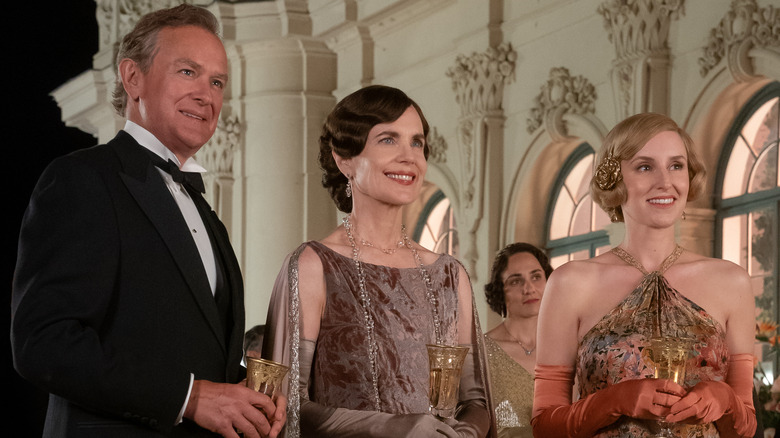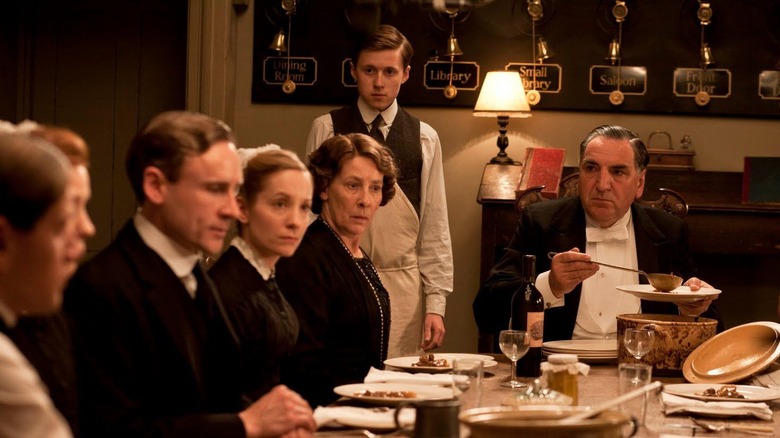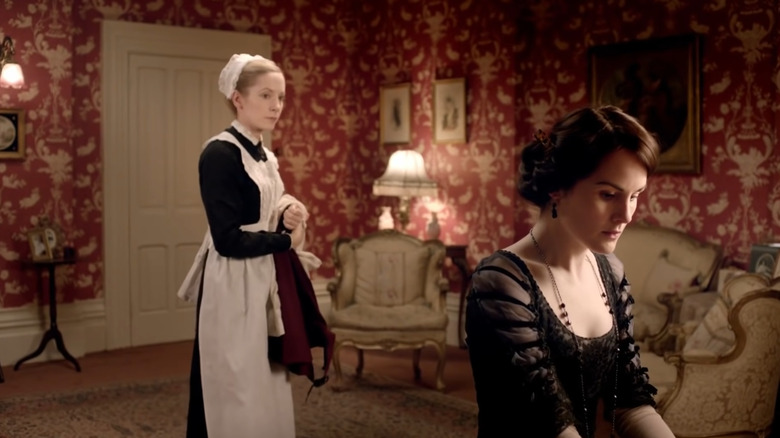One Thing Has Never Changed About Writing Downton Abbey
"Downton Abbey" has endured across six seasons of television and two feature films as an ensemble-driven costume drama about the momentous lives of the aristocratic Crawley family and the downstairs staff that serve them. There are a lot of people to keep track of, which seems like a huge task to take on seeing as "Downton Abbey" is always adding new characters each season. But series creator Julian Fellowes ("The Gilded Age") has shown that he's more than up to the task.
I think it's pretty astounding that Fellowes is not only the head honcho who built "Downton Abbey" from the scraps of a potential "Gosford Park" spin-off, but he's also written every single episode, in addition to both feature films. Usually, a show passes the reins off to a writer's room, but this is a case where the series is largely the brainchild of one person. This is Fellowes' project through and through.
Ever since "Downton Abbey" premiered in 2010, the series has become a worldwide phenomenon with people falling in love with these characters. But the way in which we discuss privilege has changed a lot since then.
Fellowes believes 'Downton Abbey' is a 'fairly truthful reflection of that society'
When interviewed by NPR for "Downton Abbey: A New Era," Fellowes was asked if anything had changed in regard to writing characters on both sides of the privilege scale since the series began, to which he didn't think so. He believes the resentment of characters like Miss O' Brien (Siobahn Finneran) or the adoration of characters like Mr. Carson (Jim Carter) are a "fairly truthful reflection of that society."
Fellowes also adds that delving into the darker aspects of period shows like "Downton Abbey," while they can be meaningful, isn't really a prerequisite for him:
"I think in the end, you know, when you're going to make any film, any TV show and write a book, what you're trying to do is to tell a reasonably truthful story about a group of people. You know, I don't – I mean, this modern thing, present thing that nothing is valid that isn't about misery – I don't agree with that. I think misery is fine to investigate and to dramatize and all the rest of it, but I don't think it's compulsory."
To an extent, I see where Fellowes' line of thinking is coming from. "Downton Abbey" is a romanticized fantasy of a bygone era. It's okay to acknowledge and enjoy it as one. After all, it hasn't really claimed to be anything else. The series has never fully shied away from topics like racism, the horrors of war, and sexual assault. Fellowes respects his characters, but his introspection usually stops short of making the Crawleys truly reprehensible.
Downton Abbey has always been an affluent fantasy
There's one aspect of "Downton Abbey" that's difficult to ignore, and that's how it decides to present the relationships between the Crawleys and their staff. With some exceptions aside, they all tend to get along fine. One of the series' closest connections is that of Lady Mary (Michelle Dockery) and her personal maid Anna (Joanne Froggatt).
Can they ever really be friends? The answer, truthfully, is no. The entire hierarchical stature of Downton draws a line between the privileged high society folks and the working class. Anna has had to help Lady Mary deal with avoiding scandal on a number of occasions, and the show posits it as two friends helping one another. "Downton Abbey," however, rarely addresses the implications of a supposedly friendly employer looming the threat of unemployment over their head should they not comply.
If the series were true to reality, the moment the Crawleys discovered an inkling of Thomas Barrow's Queerness, they most likely would have gladly given him up, if not had him imprisoned. But the show can't show them doing this because if the Crawleys do something horrible such as fire a Queer worker or someone who passively disagrees with them, while keeping the fantastical tone of the series, then the illusion of generosity on their part is shattered.
If the Crawleys are as unbearable as they actually would have been, this series would be pretty uncomfortable to watch. They have to show some level of respectability towards the staff, or else what would be the point in watching them beyond a sanitized condemnation of an outdated way of life?
"Downton Abbey" is currently streaming on Peacock.


